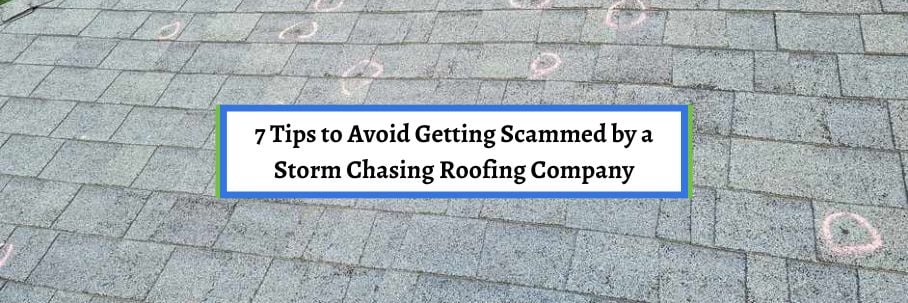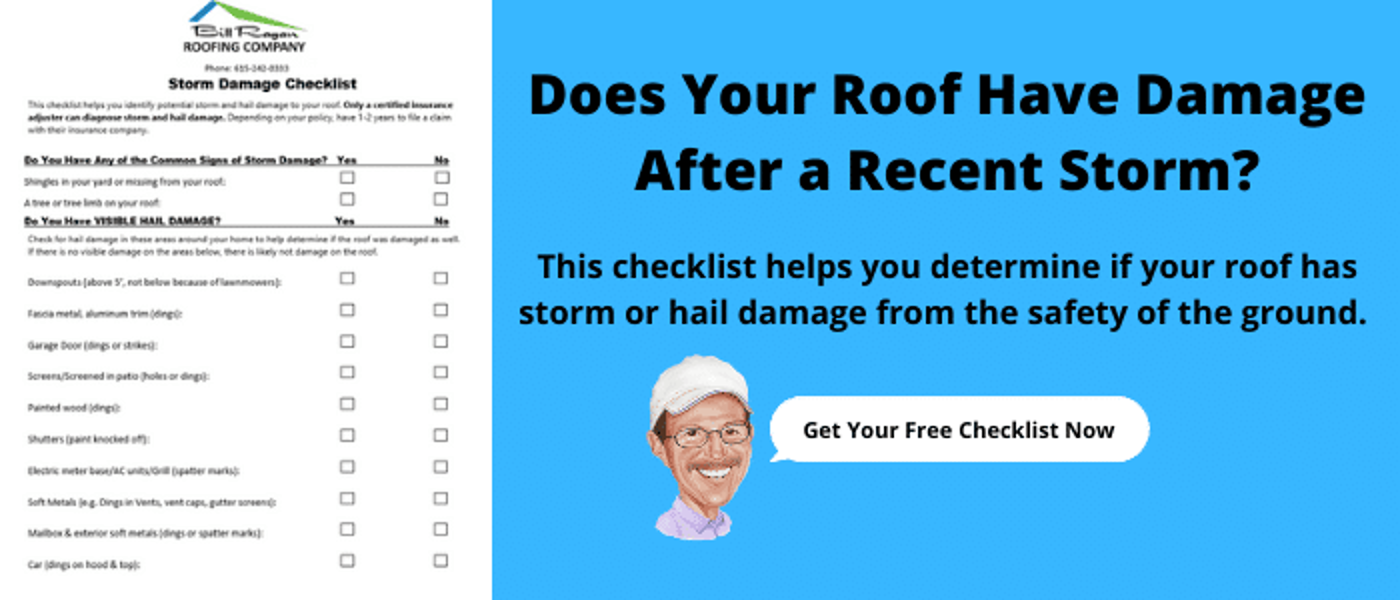7 Tips to Avoid Getting Scammed by a Storm Chasing Roofing Company

When most people think of a storm chaser, they think about someone chasing tornados or other extreme weather for thrills. But in the roofing industry, they’re known for going into areas after a big storm to sell roofs.
It’s inevitable after big storms to have highly-trained salespeople going door to door using scare and scammy tactics to take advantage of unsuspecting homeowners. This just adds to the distrust homeowners have in the roofing industry.
The last thing you want is to get scammed into buying a new roof using insurance money. You especially don’t want to be tricked into committing insurance fraud or a badly installed roof.
For over 30 years, Bill Ragan Roofing has tried to give homeowners more faith in the roofing industry by providing transparent advice. Now, I’ll give you some advice on avoiding scams.
Below are 7 tips to avoid getting scammed by a storm chasing roofing company.
1. Don’t panic when you hear your roof has storm damage
Storm chasers coming into your neighborhood are there for one reason: to sell you a roof. They’re counting on you to overreact once they say your roof has storm damage and sign a contract.
The most important thing you can do in this situation is not panic. Of course, storm damage is stressful and can be serious.
However, there’s no reason for immediate panic if you don’t have an active roof leak or widespread damage. You still need to get it inspected in a timely manner, but you should find a company you trust instead of the first person knocking on your door.
Plus, you have 1 to 2 years to file a claim if your roof has storm damage (depending on your insurance policy). So, there’s no reason to rush into buying a new roof from a storm chasing company when they say you have roof damage.
2. Check for a local phone number and office location
While there are local roofing companies whose main income source is insurance claims, many storm chasers come in from out of state. Any potential roofing company, no matter if it’s insurance or retail work, should have a local office and phone number area code.
That’s why one of the easiest ways to avoid getting scammed by storm chasing companies is to ask for their office address and phone number right off the bat. I’m not saying all out-of-state companies are out to scam you.
But if you have people knocking on doors after a storm, it’s a good bet they’re in the area following the damage path and selling roofs.
3. Ask to see the roofing company’s paperwork
Every roofing company should be licensed, bonded, and insured in the state(s) they operate in. These three pieces of paper protect you and your investment by ensuring the job is done right.
That’s why it’s crucial to ask for their paperwork to ensure they’re licensed, bonded, and insured specifically in your state. If they’re missing even one of the three, it puts you, your roof, and even your wallet at risk.
Every state has different requirements and may not even require one or the other. However, I recommend avoiding roofers who aren't licensed, bonded, and insured in your state.
Otherwise, if something goes wrong, you’ll have literally zero recourse.
4. Don’t fall for prices that are too good to be true
One of the easiest ways storm chasing companies get homeowners to sign a contract is the prices they offer. They’ll say they can do the work for whatever the insurance company pays and hope you’ll jump right at it.
Unfortunately, it’s very effective. What they don’t tell you is that most initial insurance estimates are missing crucial line items that need to be supplemented.
I guarantee most reputable roofing companies can’t do the full scope of work for what insurance initially offers. That’s why it’s crucial not to fall for low prices that are too good to be true.
After all, a storm chaser’s only job is to get you to sign a contract, get your insurance money, and move on to the next storm-hit area. They don’t care if local codes are followed or your roof is properly installed.
Even worse, they won’t be around to answer the phone when problems start.
5. Don’t sign anything or let anyone on your roof
When a storm chaser knocks on your door, they’ll want to do an inspection. However, there’s a good chance they’ll want you to sign something before doing so.
No matter what they tell you, DON’T sign anything they put in front of you or let them get on your roof. This a clever trick to get on your roof to do a roof assessment without mentioning that you’re also giving them the rights if the claim is approved.
This means you have to use their company for your roof replacement, and breaking the contract could have financial implications. While not as common, there are cases where storm chasers even cause damage themselves to make it look like a viable claim.
If a storm chaser comes to your door saying you have storm damage, thank them and tell them you’ll reach out to your insurance company. But under no circumstances should you sign anything or let them get on your roof.
6. Avoid the deductible trap
When your insurance claim is approved, you must pay your deductible. Unfortunately, bad roofing companies and storm chasers offer to take care of the deductible to seal the deal.
This is one of the most prevalent scams in the roofing industry and is outright insurance fraud. While you may think you’re getting a great deal or avoiding a high deductible, I promise you don't want to hire a roofing company that does business this way.
I also guarantee their workmanship will be poor, and you’ll have no recourse because you literally broke the law when getting your new roof. I get that saving money is important, but it’s not worth committing insurance fraud.
That’s why you should NEVER listen to a roofing company or anyone else willing to pay your deductible.
7. Tell them you’ll reach out to your preferred roofing company
The best way to avoid getting scammed by a storm chaser is to avoid them altogether. If a storm chaser knocks on your door saying you have storm damage, simply tell them you’ll reach out to your trusted roofer and insurance company.
Even if you don’t have a roofing company yet, this at least gives you time to look for and choose one that’s local to your area. It also means you’ll have a chance to talk to your insurance company about next steps and moving forward with the process.
The insurance process can drag out, so there’s no reason to jump the gun just because a salesman is knocking on your door. After all, the insurance adjuster is the only one who can approve your claim.
That’s why you need to thank them for the information, find a local roofing company for an inspection, and go from there. Not only does this prevent scams, but it’s also the proper process to get your storm-damaged roof replaced.
What do you need to know before filing an insurance claim for roof damage?
Now you know the 7 tips to avoid getting scammed by companies chasing the storms that just came through your area. As long as you follow the advice in this article, I’m confident you’ll avoid the bad reputation that follows the roofing industry.
The most important thing is not to panic when your roof is damaged. However, you do need to find a local company for an inspection and determine whether it’s worth filing a claim.
Unfortunately, the claim process is full of headaches and confusion, and the misinformation floating around doesn’t help. So, before diving headfirst into the unknown, there are some things you need to know.
That’s why I wrote another article breaking down what you need to know when filing a claim for roof damage.
Check out 7 Things You Need to Know About the Insurance Process for Roof Damage to feel confident when filing a claim with your insurance company.


